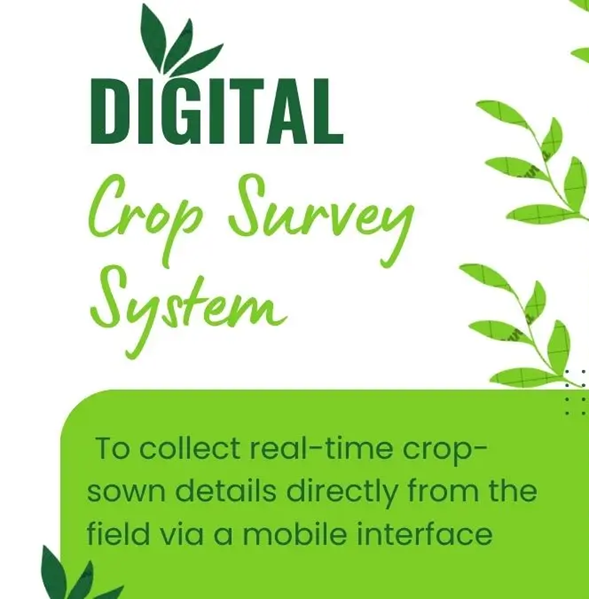Context:
The Ministry of Agriculture and Farmers Welfare has launched the Digital Crop Survey (DCS) System, a groundbreaking initiative aimed at gathering real-time crop-sown details directly from the field through a mobile interface. This innovative system ensures precise and up-to-date information on crop areas for every agricultural plot, crucial for accurate production estimations.
Key Features of the DCS System
- Real-time Data Collection: The Digital Crop Survey (DCS) System enables the direct collection of data from agricultural fields, reducing the potential for errors and significantly enhancing the efficiency of data gathering.
- Agri Stack: A digital platform built in compliance with the Digital Personal Data Protection Act, 2023, the Agri Stack ensures complete privacy and security of farmers' data by adhering to stringent data protection standards.
- Farmer-centric Approach: The system places control in the hands of farmers, allowing them to manage how their data is shared. Data is only shared with authorized entities and for clearly defined purposes, ensuring transparency and trust.
- Federal Structure: The DCS System’s federal framework allows states to retain full control over their data, enhancing privacy and governance at the state level while maintaining central oversight.
- Robust Cybersecurity Measures: In line with best practices, the Government of India follows the Ministry of Electronics and Information Technology (MeitY) and Indian Computer Emergency Response Team (CERT-In) guidelines to secure data through encryption, secure APIs, and token-based authentication.

Benefits of the DCS System
- Improved Crop Area Estimation: The real-time and accurate data collected by the system supports better crop area estimations, which is vital for making informed decisions regarding agricultural policies and support.
- Enhanced Farmer Support: The system helps streamline services like Minimum Support Price (MSP)-based procurement, crop insurance, and credit card-linked crop loans, ensuring that farmers receive more timely and relevant assistance.
- Increased Efficiency: By automating and digitizing data collection, the system minimizes manual errors, leading to greater efficiency and effectiveness in the agricultural sector.
Challenges and Limitations
- Uniformity in Reach: The success of the system hinges on its ability to provide consistent coverage across all states. Currently, a few states are fully covered, while others may lag behind in their adoption and implementation.
- Technical Issues: Challenges such as network connectivity issues in rural areas and inconsistencies in satellite imaging precision may hinder the accurate collection of data, potentially affecting the quality and reliability of the information gathered.
- Farmer Familiarity: A significant number of farmers and field officers may have limited digital literacy, which could lead to inaccuracies or errors in data entry. Ensuring that farmers are well-versed in using the system is essential for achieving accurate and effective data collection.
Conclusion:
The Digital Crop Survey (DCS) System is a game-changer for India’s agricultural sector, bringing real-time, accurate data to the forefront of agricultural policy-making and support programs. By ensuring data privacy, enhancing farmer support, and promoting digital inclusion, the system promises to usher in a new era of efficiency and transparency in agriculture.







